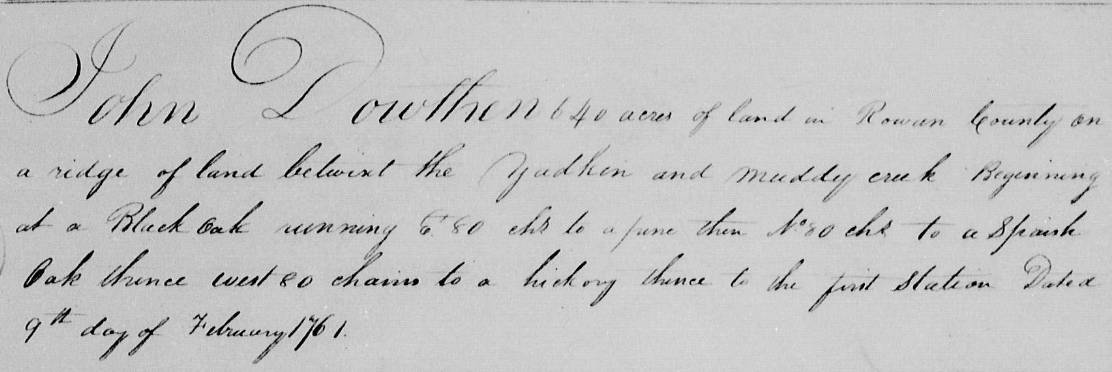- map
- how you can help
- FAQ's
- contact
- copyright
-
ahnentafel and citation # display:| |

| Snapshot: | immigrated from Ireland to America; gave material support to American patriots during the Revolutionary War; owned slaves |
| Parents: | unknown |
| Born: | 9 May 1709 Coleraine, Kingdom of Ireland |
| Died: | 22 February 1784 around 4:00 to 5:00 AM Hope, Rowan County, North Carolina |
| Buried: | Old Hope Moravian Church Cemetery, Forsyth County, North Carolina Cemetery's Coordinates: N36.0284 W80.3486 |
Late in life,
|
Memoir of the married Brother John Douthid, Sr., who passed away in Hope, Feb. 22, 1784. He was born on May 9, 1709, at Coltrain [Coleraine], in the north of Ireland. His father was a Quaker, and his mother belonged to the Presbyterian Church in which he was baptised and brought up. As he grew older he learned the trade of a weaver, and in his fifteenth year [i.e., late 1724 or early 1725] came to America. He worked at his profession in various places in New York and Pennsylvania, ultimately going to Manakosy [Monocacy] in Maryland, where in 1738 he married Mary Wilson, now his widow. God blessed them with 7 sons and 4 daughters, by whom he had 36 grandchildren and one great-grandchild; all living except one son and one grandchild. Some of them belong to the Hope Society and the rest are friends of the Brethren. |
Other records corroborate
On 25 February 1743 he purchased a 50-acre tract called "Douthit's Chance" in Prince George's County, Maryland.

The memoir's mention of "Mary Wilson" seems to be an error, since the surname Wilson is not corroborated by other records and indeed is contradicted by 1865Mary's tombstone and her own memoir, both of which show that her maiden name was Scott.
The memoir continues:
|
In the year 1750 he moved with his family from Maryland to North Carolina, settling at the southwest corner of the land, known as Wachovia, which the Brethren took two years later. |
After settling in North Carolina, on 9 February 1761

The memoir continues:
|
When the first Brethren came, and the country was sparsely settled, he shared with them the surplus of the food supplies which his industry had earned for him; and when he saw that he was dealing with upright people he not only became a good neighbor but came to have a real love for them and trust in them. That was the reason that he sometimes attended the English preaching in Bethabara, where during a certain sermon preached by the now departed Br. Rogers the Saviour for the first time knocked at his heart. As he was by nature light-minded and inclined to drink, the calls to grace always passed away, but the Good Shepherd, seeking His lost lamb, continued to follow him, until He found him. After a while he invited the Brethren to hold meetings in his house, and through them, and especially through the sermons of the now departed Br. Utley, he became more and more convinced that he needed a Saviour, and the Holy Spirit blessed to his heart the witness to the sufferings and death of Jesus. |
On 4 April 1763,
(On a somewhat separate note, in 1770
The memoir continues:
|
When several families, who were acquainted with the Brethren, came from Carols Manor in Maryland to Hope he helped them in their outward affairs with word and deed, as he always gladly helped and served the poor. He assisted them in the building of a schoolhouse, and as more families gathered who loved the Brethren and united themselves in a Society he became a member thereof. When in the year 1780, at the time of Br. Reichel's visitation, a small congregation of English-speaking Brethren was organized, he was glad and often spoke of the conversations which he had had with the aforesaid Brother. On June 10, 1781, he was received into the congregation. The Saviour now brought him to a full knowledge of himself; he sought and found grace and the forgiveness of his sins in the blood of Jesus; and while he had hitherto been much given to drink he turned entirely away from it, so that one could heartily rejoice over him. |
The memoir is silent about
Although
Another record from around this time mentions one of
The memoir continues:
|
On March 28, 1782, on Maundy Thursday, he partook with the congregation of the Holy Communion, and indeed for the first time in his life, which so excited him that he was like a happy child. He judged himself unworthy of the grace which the Saviour had given to him, and often said: "I came only in the eleventh hour, but the Saviour took pity on me, although I had distressed Him and had held His grace of little worth." Although he was already old, and weakness was increasing, yet he never missed a service unless he must. He loved and was beloved, and his children, friends, and Brethren respected him as a father. The salvation of his children lay much upon his heart, and he often prayed earnestly for them, and we hope that the Saviour will not let his prayers remain unanswered. For several winters he has been sickly, and there were clear signs of consumption, so that last winter his home-going was expected, but last summer he again seemed well. This winter his illness brought much discomfort, so that many a day and night were sleepless, as he sat in his chair. But in spite of pain he was patient, speaking much with the Saviour, Who gave him peace, comfort, and encouragement when things seemed beyond bearing. When one spoke with him about the love of the Saviour for poor sinners, and His great mercy, he brightened up saying: "I rely only on Him and His Atonement. He has bought me, a poor sinner, with His blood, and I hope that He will have mercy on me and never cast me off." When questioned he also spoke of his joy in looking toward the moment when he would be taken home to see Him on Whom he had believed; and refreshed himself on the hymns that were now and then sung for him. The day before his home-going he said: "The Saviour will soon put an end to all my misery, and will take me to Himself." He was conscious to his last breath, and passed away gently and peacefully between four and five o'clock on the morning of the 22nd, after his life-journey had lasted 74 years and 10 months. |


1: Adelaide Fries, ed., Records of the Moravians in North Carolina, Volume V: 1784-1792 (The North Carolina Historical Commission, Raleigh, 1941), pages 2408-2409.
2: State of Maryland, Calendar of Maryland State Papers No. 1: The Black Books (Wildside Press, 2009), page 42. The name John Dowthit is on a list of taxables for Monocosie Hundred, Prince George's County for the year 1733.
3: Johann Casper Stoever, Records of Rev. Johann Caspar Stoever: Baptismal and Marriage, 1730-1779 (Harrisburg Publish Company, Harrisburg, Pennsylvania, 1896), page 13. The relevant entry reads, "JOHN TONDITH, (Monocacy.) Tondith--Elizabetha, b. April 29, 1739; bap. May 2, 1740. Sponsors, Heinrich Bischoff and wife Elizabetha."
4: Maryland State Archives accession MSA SA1203-763, patented certificate 692, for 50 acres in Prince George's County patented to John Douthit on 25 February 1743. Archives of Maryland Online, <https://plats.msa.maryland.gov/pages/unit.aspx?cid=PG&qualifier=S&series=1203&unit=763&page=adv1&id=1083237403>, accessed 4 March 2021.
5: The tombstone of Mary Douthit, "Born Scott" (1721 - 29 June 1794), Old Hope Moravian Church Cemetery, Forsyth County, North Carolina. The cemetery is at coordinates N36.0284 W80.3486.
6: The Moravian memoir of Mary Douthit (maiden name Scott), said to be inserted in the "Diary of Salem and other congregations" for the year 1794. Moravian Archives, Winston-Salem, North Carolina.
7: Ruth Long Douthit and Davis Douthit, Here Come the Douthits: Coast to Coast Across Two Centuries (2nd printing, published by Jennifer Douthit Boget and Sue Douthit O'Donnell, 2003), page 9. The authors cite as the letter's source: "The Fries letter is part of the John Howard Pierce Genealogical Collection at the Arkansas History Commission in Little Rock, Arkansas."
8: Maryland State Archives accession MSA S1197-1241, patented certificae 1177, for 280 acres in Frederick County patented to Alexander McKeen on 30 October 1752. Archives of Maryland Online, <https://plats.msa.maryland.gov/pages/unit.aspx?cid=FR&qualifier=S&series=1197&unit=1241&page=adv1&id=1668754388>, accessed 4 March 2021.
9: North Carolina state land patent, Rowan book 6, page 141, file #181 and grant #54, issued 9 February 1761 to John Dowthen for 640 acres On a ridge of land betwixt the Yadkin and Mud[d]y Creek. North Carolina MARS ID 12.14.107.183. <https://www.nclandgrants.com/grant/?mars=12.14.107.183&qid=626908&rn=142, accessed 7 March 2020.
10: Records of the Moravians, Volume V, op. cit., page 270.
11: Rowan County, North Carolina. Deeds book 7, pages 379-380. FamilySearch, <https://www.familysearch.org/ark:/61903/3:1:3QS7-898Q-3SM4?i=390&cat=328774>, accessed 7 March 2021.
12: Adelaide Fries, ed., Records of the Moravians in North Carolina, Volume IV: 1780-1783, page 1527.
13: ibid., page page 1832.
14: Rowan County, North Carolina. Original wills, folder for John Douthit (1782), whose will is dated 28 December 1782. FamilySearch, <https://www.familysearch.org/ark:/61903/3:1:3QSQ-G9G4-3Y9B?i=493&cat=457207>, accessed 7 March 2021.
15: The tombstone of William Douthit (died 22 February 1784), Old Hope Moravian Church Cemetery, Forsyth County, North Carolina. The cemetery is at coordinates N36.0284 W80.3486. Photo taken by